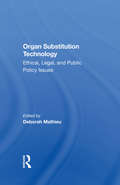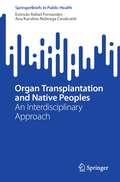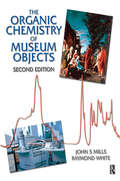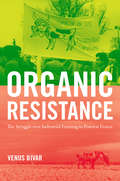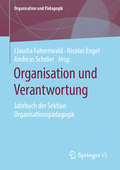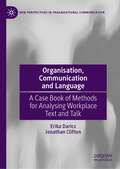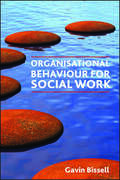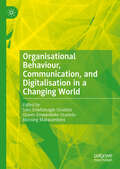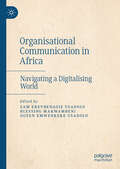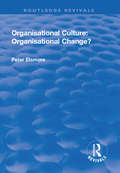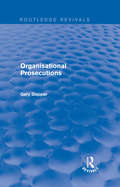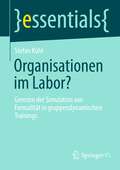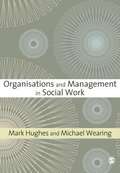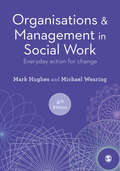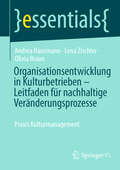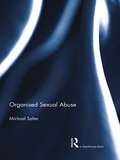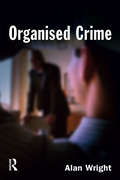- Table View
- List View
Organ Substitution Technology: Ethical, Legal, And Public Policy Issues
by Deborah MathieuThis book describes and assesses some of the more important difficulties and defects in the current utilization of organ substitution technology, dealing with the major ethical, legal, and public policy issues of organ substitution.
Organ Transplantation and Native Peoples: An Interdisciplinary Approach (SpringerBriefs in Public Health)
by Estevão Rafael Fernandes Ana Karoline Nobrega CavalcantiThis book presents important concepts from medical and socio-cultural anthropology to health professionals working with organ transplantation involving indigenous populations. Written by an anthropologist and a nephrologist working at the Brazilian Amazon region, it presents an interdisciplinary approach merging perspectives from medical and socio-cultural anthropology, social epidemiology and clinical medicine to blend philosophical concerns around tissue and organ exchange with transplant-related initiatives in order to help health professionals develop care protocols that take into account the specific cultures of indigenous populations.The approach proposed in this book is based on the assumption that there are other concepts of bodies, personhood, health, sickness, and collectivity implicated in processes of organ transplantation and health care in general that must be taken into consideration beyond strictly biomedical perspectives. Such cultural aspects also imply challenges in terms of bioethics and legislation, given the need to respect indigenous cultures. So, in order to offer health professionals practical insights, the book presents a review of the literature available about experiences of organ transplantation in ethnically diverse countries and how the professionals involved have addressed this diversity respecting these groups from a cultural, ethical, and epidemiological point of view. Organ Transplantation and Native Peoples: An Interdisciplinary Approach is primarily aimed at being a practical tool for health professionals working with indigenous populations, but will also be of interest to researchers in different fields of the social and health sciences, such as medical anthropology, public health, nursing, bioethics and epidemiology.
Organic Chemistry of Museum Objects
by John Mills Raymond White'The Organic Chemistry of Museum Objects' makes available in a single volume, a survey of the chemical composition, properties and analysis of the whole range of organic materials incorporated into objects and artworks found in museum collections. The authors cover the fundamental chemistry of the bulk materials such as wood, paper, natural fibres and skin products, as well as that of the relatively minor components incorporated as paint, media, varnishes, adhesives and dyes. This expanded second edition, now in paperback, follows the structure of the first, though it has been extensively updated. In addition to chapters on basic organic chemistry, analytical methods, analytical findings and fundamental aspects of deterioration, the subject matter is grouped as far as possible by broad chemical class - oils and fats, waxes, bitumens, carbohydrates, proteins, natural resins, dyestuffs and synthetic polymers. This is an essential purchase for all practising and student conservators, restorers, museum scientists, curators and organic chemists.
Organic Resistance: The Struggle over Industrial Farming in Postwar France (Flows, Migrations, and Exchanges)
by Venus BivarFrance is often held up as a bastion of gastronomic refinement and as a model of artisanal agriculture and husbandry. But French farming is not at all what it seems. Countering the standard stories of gastronomy, tourism, and leisure associated with the French countryside, Venus Bivar portrays French farmers as hard-nosed businessmen preoccupied with global trade and mass production. With a focus on both the rise of big agriculture and the organic movement, Bivar examines the tumult of postwar rural France, a place fiercely engaged with crucial national and global developments.Delving into the intersecting narratives of economic modernization, the birth of organic farming, the development of a strong agricultural protest movement, and the rise of environmentalism, Bivar reveals a movement as preoccupied with maintaining the purity of the French race as of French food. What emerges is a story of how French farming conquered the world, bringing with it a set of ideas about place and purity with a darker origin story than we might have guessed.
Organisation und Verantwortung: Jahrbuch der Sektion Organisationspädagogik (Organisation und Pädagogik #27)
by Nicolas Engel Andreas Schröer Claudia FahrenwaldDas Jahrbuch möchte in theoretischer, empirischer und pragmatischer Perspektive zur Klärung einer (organisations-)pädagogischen Verhältnisbestimmung von Organisation und Verantwortung beitragen. Im Rekurs auf die internationale und interdisziplinäre Diskussion zum Begriff der Verantwortung in seiner ethischen, gesellschaftlichen, politischen und pädagogischen Dimension werden organisationstheoretische Fragen und organisationspädagogische Heraus-forderungen bearbeitet. Die Beiträge beschäftigen sich mit dem Thema im Hinblick auf Rolle, Funktion(en) und Bedeutung von Verantwortung in, von und zwischen Organisationen als zentrale Träger des kulturellen und gesellschaftlichen Wandels. Über das Schwerpunktthema hinaus enthält das Buch weitere Beiträge zu aktuellen organisationspädagogischen Fragestellungen.
Organisation, Communication and Language: A Case Book of Methods for Analysing Workplace Text and Talk (New Perspectives in Organizational Communication)
by Erika Darics Jonathan CliftonThis book showcases various methodological approaches to the analysis of organizational talk and text. Arguing that organizations are discursive constructions that are communicatively constituted, the authors use the analysis of transcripts of audio-recordings of naturally-occurring workplace talk and authentic written texts to demonstrate what applied linguistics has to offer to scholarly research into organizations as well as management practice and training. The authors discuss the theoretical underpinnings of discursive approaches to the role language in the communicative constitution of organization, and then each chapter focuses on one particular analytical approach. The chapters cover conversation analysis; membership categorization analysis, positioning theory; ventriloquism; metaphor analysis; and metadiscourse analysis and computer-mediated discourse analysis. Consequently, this interdisciplinary work presents a number of methods that allow researchers unfamiliar with fine-grained linguistic analyses of naturally-occurring talk and text to explore ways of adding to their repertoire of research skills.
Organisational Behaviour for Social Work
by Gavin BissellOrganisational behaviour for social work unites the well-established study of behaviour in organizations with the special, and sometimes unusual, organizational settings of social work practice. In doing this, it recognizes the gendered nature of social work organizations, but, uniquely, retains simultaneously the valuable insights of mainstream organizational behaviour research, despite its often male context. Another innovation of the book is the targetting of non-traditional organizational behaviour audiences. For, where previous textbooks have tended to cater for managers, this book is aimed at the social work practitioner, and others who interact with social work organizations. Finally, the book uses real social work case examples to flesh out traditional organizational behaviour concepts, and, in doing so, also explains the impact of recent organizational changes upon social work practice.
Organisational Behaviour, Communication, and Digitalisation in a Changing World
by Sam Erevbenagie Usadolo Blessing Makwambeni Queen Emwenkeke UsadoloThis book brings together leading scholars and practitioners in organizational behaviour and communication to explore the complex relationship between employees and their organisations and the associated workplace outcomes. This comprehensive volume provides insights, theories, and practical strategies to understand and address the multifaceted nature of organisational dynamics in the face of constant and accelerated change. The first section of the book delves into the theoretical foundations of organisational behaviour. Some of the contributors in this section offer a comprehensive analysis of the socio-cultural and psychological aspects that influence individual behaviour within organisations. Building upon this foundation, the subsequent sections of the book examine various dimensions of organisational behaviour, including leadership, teamwork, diversity, and conflict resolution. One of the focuses of this edited volume is the examination of emerging technologies and their effects on the operation of organisations. Hence, some of the chapters examine the management of employee-organisations using digital platforms and explore employee engagement, collaboration, the effect of organisational support, supervisor support, or lack thereof. By delving into the role of digital technologies in the context of a changing world, the book offers valuable insights into the development of contemporary organisations, especially how technology is leveraged to foster a sense of connectivity in dispersed work environments.
Organisational Communication in Africa: Navigating a Digitalising World
by Sam Erevbenagie Usadolo Blessing Makwambeni Queen Emwenkeke UsadoloThis book delves comprehensively into organisational communication in Africa in the digital age, alongside other organisational changes. This makes it a valuable resource for scholars, practitioners, and students in organisational communication, corporate communication, public relations, and development communication – both within Africa and across the globe. Through diverse perspectives and evidence-based insights, the book equips readers with the knowledge and tools needed to navigate the ever-changing organisational landscape and achieve success in our rapidly evolving world.
Organisational Culture: Organisational Change? (Routledge Revivals)
by Peter ElsmoreThis title was first published in 2001. When organizational change occurs, members of the organization can feel insecure in the face of a seemingly uncertain future. This work investigates the links between organizational culture and organizational change by looking at two businesses that have been privatized - British Gas and British Telecom - and the processes surrounding the ways these organizations changed in the mid 1990s. It includes interviews with middle-ranking and senior officals, illustrating that anguish is experienced not only by those on the lower rungs of the corporate ladder.
Organisational Prosecutions (Routledge Revivals)
by Gary SlapperThis title was first published in 2001. The central theme of this book is the activity of the multifarious agencies, local and central government departments, private companies and organizations, which act as prosecutors in the branch of the criminal justice system which deals with 95 per cent of all offences: the magistrates' court. There are over 30 prosecuting organizations (21 are featured in this text) which act regularly in over 400 courthouses in England and Wales. This activity, involving many people and a large amount of resources, accounts for approximately one fifth of all activity in the criminal courts, and yet almost no research has been conducted in this area. Based on a year's extensive study of all of the organization prosecutions brought before three magistrates' courts in different regions, the text analyzes a number of important issues, including the different approaches taken by the different organizations, their conviction rates, and the type of sentencing used for different sorts of cases.
Organisationale Umweltbeobachtung: Eine systemtheoretisch orientierte empirische Studie zur Theorieentwicklung in der Organisationskommunikation
by Britta Maria GosselOrganisationale Umweltbeobachtung ist bislang kaum im Fokus der Organisationskommunikation. In dieser Arbeit werden auf Basis der systemtheoretischen Organisationstheorie sechs Programme entwickelt, welche die Prozesse organisationaler Umweltbeobachtung beschreiben. Grundlage dafür bildet die Analyse von 485 im Rahmen einer qualitativen empirischen Studie mit High-Tech KMU erhobenen Unternehmensprogrammen. Die Ergebnisse tragen zur Theorieentwicklung in der Organisationskommunikation bei und können als Exportvorschlag andere Disziplinen bereichern.
Organisationen im Labor?: Grenzen der Simulation von Formalität in gruppendynamischen Trainings (essentials)
by Stefan KühlIn gruppendynamischen Trainings wird viel über das Leben in Freundeskreisen, Liebesbeziehungen, Jugendcliquen, Wohngemeinschaften, Straßengangs, Terrorgruppierungen oder Kleinfamilien, aber kaum etwas über die Dynamik in Unternehmen, Verwaltungen, Ministerien, Armeen, Polizeien, Krankenhäusern, Universitäten oder Schulen abgebildet. In diesem Buch wird gezeigt, wie gruppendynamische Trainings den Übergang von einer Gruppe zu einer Organisation unterbinden – durch den Druck zur personenbezogenen Kommunikation, durch ihre Entmutigung der Ausdifferenzierung von Rollen, durch die Verhinderung von Hierarchien und durch eine Tendenz zur Diffusität der Themen.
Organisationen in Zeiten der Digitalisierung (Sozialwissenschaften und Berufspraxis)
by Birgit Blättel-Mink Katrin Späte Torsten Noack Corinna Onnen Rita Stein-Redent Michael OpielkaSie ist schon sehr lange kein Neuland mehr, die Digitalisierung. Aus sozialwissenschaftlicher Sicht sind allerdings längst noch nicht alle Veränderungen, die in Organisationen unter dem Begriff „Digitalisierung“ als Innovation subsumiert und seit langer Zeit vollzogen werden oder sich auch erst in Planung befinden, ausgeleuchtet. Mit diesem Band möchten wir dazu beitragen, diese vielfältigen Prozesse, die einen sozialen Wandel in und durch Organisationen initiieren, sedimentieren und beschleunigen, durch sozialwissenschaftliche Analysen abzubilden.Wie stellen sich Auswirkungen von Digitalisierungsprozessen in den jeweiligen Strukturen, Zielen und Mitgliedschaften für die Organisationsmitglieder oder externe Beobachtende dar? Wie verändert die Digitalisierung Berufsbilder, wie wird sich das allgemeine Verständnis von Beruflichkeit entwickeln? Welche Auswirkungen hat dies auf bestehende soziale Ungleichheiten? Die neunzehn Beitragende kommen aus den unterschiedlichsten sozialwissenschaftlichen Arbeitsfeldern im In-und Ausland.
Organisationen nachhaltig bewegen: Systemische Organisationsentwicklung zum Nachhaltigen Unternehmen (BestMasters)
by Christiane Lüschen-HeimerOrganisationen sind das Zentrum unserer Gesellschaft. Als solche sind sie Vorreiterinnen in der Entwicklung nachhaltiger Abläufe zur Abwendung der Klimakatastrophe.Dieses Buch lädt ein, Nachhaltigkeit systemtheoretisch zu definieren und bietet über dieses Verständnis ein Haltungs- und Handlungsmodell für den Veränderungsprozess. Er wird möglich, wenn wir Organisationen nicht mehr als Zusammenschluss von Subsystemen und organisationalen Abläufen betrachten. Wenn wir sie in der Einheit von Ökologie, Ökonomie und dem sozialen (menschlichen) Aspekt verstehen, ist eine nachhaltige Transformation möglich. Dann erst ist das Unternehmen/die Organisation den Menschen und der Gesellschaft förderlich. Der systemische Blick auf Organisation und nachhaltige Transformation befähigt Menschen.
Organisationen und Netzwerke beraten lernen: Eine Analyse organisationspädagogischer Professionalisierung (Organisation und Pädagogik #34)
by Marc-André HeidelmannDie Arbeit setzt sich theoretisch, methodologisch und empirisch mit den Bedingungen und Möglichkeiten von Beratungslernen im Rahmen eines organisationspädagogischen, universitären Aus- und Weiterbildungsprogramms auseinander. Im Rahmen eines einjährig angelegten Fortbildungsprogramms wurden Studierende verschiedener Masterstudiengänge wissenschaftlich fundiert sowie problem- und erfahrungsorientiert darauf vorbereitet, regionale Vernetzungsprozesse für Kreislaufökonomien methodisch zu unterstützen und zu begleiten. Die qualitativ-längsschnittliche Erhebung sowie die metaphern- und diskursorientierte Analyse der sich vollziehenden Professionalisierungsprozesse der am Programm beteiligten Studierenden steht im Zentrum der Analyse. Mit der Untersuchung von Aneignungsmustern der Noviz*innen im Feld der organisationspädagogischen Organisations- und Netzwerkberatung bearbeitet der Autor das Desiderat längsschnittlicher Analysen von Professionalisierungsprozessen hochschulischer Beratungsausbildungen. Das Buch leistet nicht zuletzt auch grundlagenforschend einen Beitrag zur Entwicklung einer eigenen Begründung beziehungsweise eines möglichen Propriums organisationspädagogischer Organisations- und Netzwerkberatung und somit zur Fortentwicklung dieser jungen Subdisziplin insgesamt.
Organisations and Management in Social Work
by Mark Hughes Michael WearingWhat role does social work play in human service organisations? How do social workers experience and initiate organisational change? How can they engage and negotiate with managers and other professionals? How does a social worker deal with ethical and interpersonal conflicts within organisations? Organisations and Management in Social Work grounds these complex questions in a comprehensive and accessible overview of the organisational context of social work practice. The book demonstrates how effective service delivery is dependent on organisational and managerial activities and procedures, and emphasises the importance of critiquing existing organisational structures. This invaluable book: " critically examines organisational theory, managerial techniques and organisational structures " develops strategies for ethical and reflective organisational practice " promotes an understanding of how to plan and manage change in learning organisations " helps readers understand the nature of social work professionalism, including partnership and teamwork, and the inherent tensions in human service organisations " discusses important themes such as leadership, supervision, risk, decision making, and accountability " explores the potential for increasing service user and worker participation in organisations " includes extended practice examples and reflective questions. Organisations and Management in Social Work will be essential reading for social work students and professionals who wish to better understand the organisational context in which they work. Dr Mark Hughes is a Lecturer and Dr Michael Wearing is a Senior Lecturer in Social Work in the School of Social Sciences and International Studies at the University of New South Wales.
Organisations and Management in Social Work: Everyday Action for Change
by Mark Hughes Michael WearingAs a social worker, you could work in a variety of different organisations, each with their own purpose, culture and structure. Understanding and examining the complex issues involved in the management and organisational context of social work practice is crucial for practitioners and managers. This book helps you to develop strategies for ethical, reflective and relational practice, covers key themes including leadership, supervision, risk and decision making and emphasises the importance of active participation for positive change. Thoroughly updated, and with new Practice Examples demonstrating the relationship between theory and practice, this is essential reading for both undergraduate and postgraduate students of social work, as well as practising social workers.
Organisations and Management in Social Work: Everyday Action for Change
by Mark Hughes Michael WearingAs a social worker, you could work in a variety of different organisations, each with their own purpose, culture and structure. Understanding and examining the complex issues involved in the management and organisational context of social work practice is crucial for practitioners and managers. This book helps you to develop strategies for ethical, reflective and relational practice, covers key themes including leadership, supervision, risk and decision making and emphasises the importance of active participation for positive change. Thoroughly updated, and with new Practice Examples demonstrating the relationship between theory and practice, this is essential reading for both undergraduate and postgraduate students of social work, as well as practising social workers.
Organisationsbildung und gesellschaftliche Differenzierung: Empirische Einsichten und theoretische Perspektiven (Organisation und Gesellschaft - Forschung)
by Rena SchwartingDieses Open-Access-Buch bricht mit dem Konsens in der Forschung, nach dem Organisationen als Errungenschaft der modernen Gesellschaft und Produkt der Industrialisierung angesehen werden. Die Frage, wie sich Organisationen als eigenlogische Sozialform konkret ausdifferenziert haben, ist bislang weitgehend unklar geblieben. Das Buch zeigt auf, dass sich bereits in der „unorganisierten Gesellschaft“ der Vormoderne formale Organisationen ausbildeten, die eine Struktur aufweisen, wie sie heute in Krankenhäusern, Landesrundfunkanstalten, Gerichten, Schulen und Kirchen prägend ist. Dieser Organisationstypus ist dadurch gekennzeichnet, dass er neben einer „politischen Spitze“ und der damit verbundenen Rechtsbindung aus zwei übergreifenden Einheiten mit unterschiedlichen Rationalitäten besteht: Der eigentliche Kern der (medizinischen, journalistischen, rechtlichen, pädagogischen, theologischen, usw.) Leistungen wird durch professionelle Standards, Entscheidungsverfahren und Rituale zusammengehalten. Demgegenüber kümmert sich der Verwaltungsteil bei einem spezifischen Publikum um die Abnahme der im Kern erbrachten Arbeit.
Organisationsentwicklung in Kulturbetrieben – Leitfaden für nachhaltige Veränderungsprozesse: Praxis Kulturmanagement (essentials)
by Andrea Hausmann Olivia Braun Lena ZischlerDieses essential beschreibt kompakt und praxisnah, wie Organisationsentwicklungsprozesse in Kulturbetrieben erfolgreich gelingen können. Nach einer Einführung in die wichtigsten Modelle, Strategien und Ansätze skizzieren die Autorinnen den Ablauf der einzelnen Phasen – von der Zielformulierung, Planung und Analyse der Ist-Situation über die Maßnahmenentwicklung und -umsetzung bis hin zur Evaluation und Verstetigung der Veränderungen. Aufbauend darauf diskutieren sie typische Handlungsfelder und notwendige Rahmenbedingungen und zeigen auf, wie mit Widerständen und Scheitern konstruktiv umgegangen werden kann. Ein weiterer Schwerpunkt liegt auf den Akteuren der Organisationsentwicklung sowie deren jeweiligen Aufgaben und Rollen. Darüber hinaus werden praxiserprobte Tools vorgestellt, die sich für den Start, die Umsetzung und die Evaluation von Organisationsentwicklungsprozessen in Kulturbetrieben eignen.
Organisationsentwicklung in der frühkindlichen Bildung
by Monika Zimmermann Tobias SanderEinrichtungen der frühkindlichen Bildung/Kindertagesbetreuung stehen zunehmend im öffentlichen Fokus. Der Ausbau gesetzlich garantierter Betreuungsplätze, ein Mangel an qualifizierten Mitarbeiter*innen sowie die zunehmende Vernetzung im Sozialraum stellen diese Form sozialer Dienste und ,Hilfen für Alle‘ vor, in Teilen betriebswirtschaftlich imprägnierte Herausforderungen, die – in Summe – kaum zu bewältigen scheinen. Wie gehen die (steuernden) Akteure - Träger, Einrichtungsleitungen und Teams - unter Berücksichtigung der spezifischen Organisationsformen und (professionellen) -kulturen in der Kindertagesbetreuung mit diesen Anforderungen um? Welche Rolle spielen Organisationsentwicklungsansätze wirtschaftswissenschaftlicher Provenienz? Inwieweit lassen sich zunehmend heterogene Teams, Betreuungs- und gleichzeitiger Bildungsauftrag sowie immer diverser werdende Stakeholder (Erziehungsberechtigte bzw. Familien, Grundschulen, Quartiersentwicklung) in Einklang bringen? Auf Basis empirischer Befunde sowie theoriebasierter Überlegungen werden im vorliegenden Band auch Handlungsbedarfe identifiziert und Strategien der Organisationsentwicklung auf ihre feldspezfische Belastbarkeit hin überprüft.
Organisationstheorien von Weber bis Weick
by Emil Walter-BuschKlassische Texte der sozialwissenschaftlichen Organisationsforschung haben Max Weber, Chester Barnard, Herbert A. Simon und Niklas Luhmann, aber auch etwa Mary Parker Follett, Elton Mayo oder Karl Weick verfasst. Sie sind von der aktuellen Forschung weder widerlegt noch auch nur überholt worden. Das Buch möchte zum erneuten Studium der nicht selten überraschend facettenreichen, lehrreichen Schriften dieser und anderer, weniger gut bekannter Klassiker der Organisationsforschung ermuntern.
Organised Sexual Abuse
by Michael SalterOrganised Sexual Abuse offers a comprehensive, interdisciplinary investigation of this phenomenon. Since the early 1980s, social workers and mental health professionals around the globe have encountered clients reporting sexual abuse by organized groups or networks. These allegations have been amongst the most controversial in debates over child sexual abuse, raising many unanswered questions. Are reports of organized abuse factual or the product of moral panic and false memories? If these reports are true, what is the appropriate response? The fields of child protection and psychotherapy have been polarised over the issue. And, although cases of organized abuse continue to be uncovered, a reasoned and evidence-based analysis of the subject is long overdue. Examining the existing evidence, and supplementing it with further qualitative research, in this book Michael Salter addresses: the relationship between sexual abuse and organized abuse; questions over the veracity of testimony; the gap between the policing response to sexual abuse and the realities of child sexual exploitation; the contexts in which sexually abusive groups develop and operate; the role of religion and ritual in subcultures of multi-perpetrator sexual abuse; as well as the experience of adults and children with histories of organized abuse in the criminal justice system and health system. Organized Sexual Abuse thus provides a definitive analysis that will be of immense value to those with professional and academic interests in this area.
Organised Crime
by Alan WrightThis book aims to provide an accessible introduction to the study of organised crime - about those who commit it, the effect it has on individuals, businesses and states, and the ways in which states and the international community have sought to contain it. It explores all facets of what has become one of the key problems facing governments, policy makers and law enforcement agencies in the early twenty-first century. Organised Crime has four predominant themes: the nature and central concepts of organised crime the specific activities with which it is associated its origins and growth nationally, regionally and globally the efforts by the international community and law enforcement agencies to contain, regulate and control the risks that it poses. The book contains a number of detailed case studies illustrating the growth of organised crime at national, international and transnational levels, ranging from the mafia, criminal gangs in the UK through to the new wave of organised crime in Russia and the post-Soviet states. It will be essential reading for both students and practitioners in the police and other law enforcement agencies who have a concern with organised crime worldwide.
